|
JENNINGS RANDOLPH
RECOGNITION PROJECT
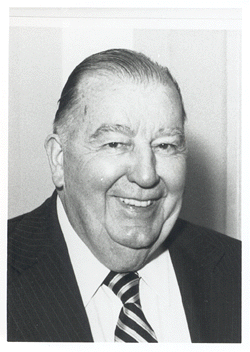
A Chronicle of an
International Leadership Record: Jennings Randolph and
The Search for
Food and Energy Security (1979-1995)
sponsored by
The
Agribusiness Council
in cooperation
with
Agri-Energy Roundtable
All Rights Reserved
Background
The Jennings Randolph Recognition Project
(JRRP) was initiated after the June 4, 1998 memorial service in the U.S.
Capitol sponsored by The Agribusiness Council (ABC) and hosted by
Randolph's former colleague, U.S. Senator Robert C. Byrd.
U.S. Senator Jennings Randolph of West Virginia
served in the U.S. Congress over five decades before retiring in 1985.
Sworn into office with the New Deal landslide and Franklin Delano
Roosevelt in 1933, Randolph served seven terms in the House of
Representatives and later was elected to the United States Senate where he
completed five terms and became a living legend. Throughout his
legislative career Randolph championed the disabled and "the man and woman
by the wayside of the road" as well as renewable energy, public
works, the
environment, and aviation/aerospace.
During his last Senate term Randolph turned his
attention to international affairs and pioneered some impressive programs
to which his unique style of leadership and senior statesmanship were
particularly well-suited. One initiative, a nonprofit and tax-exempt
association called "Agri-Energy Roundtable" (AER), gained U.N. recognition
and world acclaim through the Interparliamentary Union. Another effort,
the U.S. Institute of Peace, was signed into law over heavy opposition of
the Reagan Administration.
At a time when food and energy security issues
continue to dominate international economic agendas, Randolph's leadership
and personal campaign for sustainable trade/development ideas -- forged
through ten years of chairing the Agri-Energy Roundtable -- spark new
thinking about traditional agriculture and natural resource management.
His action inspired many people around the world, yet has been relatively
unexplored. The record of the Agri-Energy Roundtable, which has continued
to develop since Randolph left Washington in 1988, is being evaluated in
the context of the food/energy nexus and related issues which sparked its
formation. Similarly, Randolph's vision of the role of nonprofit
associations, such as AER, is being explored in the wider search for
international economic peacekeeping and civility.
|

Eldora
Nuzum, The Inter-Mountain |
WILD, WONDERFUL
"WET" VIRGINIA -- President Jimmy Carter holds the umbrella for U.S.
Senator Jennings Randolph during the West Virginia State Forest
Festival (1978). President Carter is an important contributor to
ABC's Heritage Preservation Committee projects.

|
Food/Energy Nexus:
Improving Dialogue with OPEC
Senator Randolph rejected the
confrontational "bushel for a barrel" rhetoric which emerged in the late
1970s when agricultural and energy prices spiralled upwards generating
world inflation. As many Americans, he was concerned with dependence on
foreign energy, and he endorsed various alternate and renewable energy
programs as part of a national strategy to reach greater independence. But
it was Randolph's leadership in the Agri-Energy Roundtable that
underscored his fervent desire to build bridges between the energy-surplus
and agricultural-exporting nations. The diplomatic "dialogue" approach
with OPEC nations, embodied in AER activities, enabled Randolph to advance
cooperative agricultural and energy projects with key Third World
leaders.
In 1979, Randolph sponsored a
unique, high-level exchange between U.S. and Arab leaders which led to the
first multilateral roundtable meeting in February 1980 at the port city of
New Orleans. Ironically, this came amid the turmoil of the Carter
Administration's Soviet grain embargo, and the port was clogged with
barges and ships as nervous farmers and their worldwide customers wondered
about U.S. reliability as a food supplier. Randolph later enlisted
corporate support for the AER from leading multinational petroleum and
agribusiness firms.
Contrasted to the negative,
media-driven political figures of the late 1990s, Randolph represents the
best of the "old-school" politicians. He was an honorable politician whose
leadership style, so clearly illustrated in international campaigns,
presents an important legacy for consideration by today's leaders and
future generations. JRRP's programs and publication highlight aspects of
Randolph's endearing nature as well as the decisions and skills which made
him so effective.
|
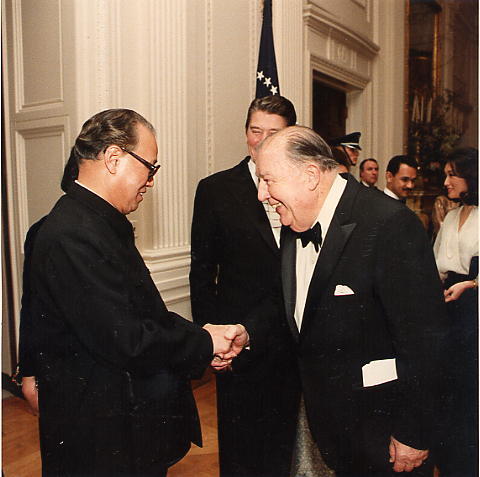
(Photo courtesy of Jennings Randolph Recognition Project)
|
STATE DINNER GUEST--Senator Jennings
Randolph (D-WV) is introduced to PRC Premier Zhao by President
Ronald Reagan at White House (January 10, 1984). This occasion
enabled Randolph to advance Agri-Energy Roundtable (AER)'s mission
to China.

|
Objectives/Aims
The Jennings Randolph Recognition
Project (JRRP) seeks to:
-
Chronicle, publish and disseminate
materials highlighting Jennings Randolph's character and leadership,
especially in the areas which are not well-researched (i.e.,
international affairs);
|
-
Identify specific events,
legislative campaigns and issues which feature Jennings Randolph's
"people power/compassion" style, providing primers on "lessons learned"
for young people;
|
-
Identify creative ways to highlight
Randolph's many contributions to West Virginia, the United States, and
the world;
|
-
Develop a database on specific agricultural
and energy issues known to be favorites of Jennings
Randolph -- and continue disseminating his views/speeches on such
issues;
|
-
Expose and/or counter any
falsehoods which may have been used to obscure Randolph's role in
building legislative history;
|
-
Identify educational opportunities
to promulgate examples of Randolph's character and virtues to young
people;
|
-
Assist other organizations which
espouse Randolph's views and/or share Randolph's priority aims as a
great American populist;
|
-
Assist the official biographer in
developing information on Randolph's international contributions;
|
-
Assist Salem International University (SIU) in organizing, preserving and protecting all of the Randolph
papers and other documentation presently stored there to insure future
generations have access to the historical record.
|
U.S. CAPITOL
MEMORIAL SERVICE
|

June 4, 1998
|

U.S. Senate
Photographer
|
U.S. Senator Edward M.
Kennedy (D-MA) eulogizes Jennings Randolph at a
tribute sponsored by The Agribusiness Council. Seated (left to right)
are John Chafee (R-RI),
Jeff Bingaman (D-NM), and Robert C. Byrd (D-WV).
___________________________________________________________________ |
Historical Education and
Leadership: JR's Footprints on the 20th Century
As we advance into the new
millenium watching the 20th century recede, there is growing nostalgia and interest in remembering
history's milestones. Randolph's life spanned each decade, and he figured
significantly during his legislative prime (1933-1985) in Washington, benefiting
many.
The Jennings Randolph Recognition
Project (JRRP) is generating positive benefits for historians and students
interested in an intriguing case study of how one senior legislator
demonstrated leadership on a world stage with a complex weave of issues
providing "a window" on his times.
The JRRP is achieving its objectives
through standard research techniques -- file and correspondence review,
interviews with former colleagues and staff as well as those who served
with Randolph on the AER board of directors, conference speeches by
Randolph and conversation memoranda between JR and industrial/political
leaders from around the world -- with interpretive analysis provided by
AER/ABC staff who worked with Randolph.
Randolph's interest in the AER model
reflected his own complex interests from high technology to alleviating
hunger and malnutrition. The story of AER and Jennings Randolph has been
chronicled, and its lessons will influence future Congressional and
Executive Branch cooperation, understanding the potential of
voluntary/nongovernmental organizations and associations in U.N.-related
programs (i.e., food security), food/energy issues within an effective
North/South dialogue, the role of enlightened private enterprise in the
development of agro-food systems, and renewable energy as a key for
sustainable agro-food development.
The JRRP publication serves as a
guide during a critical timeframe in world history when individuals and
institutions are seeking new ways of cooperating to solve the dilemma of
world food security in the 21st century. The document highlights an
important contemporary leader and his ideas at a time when leadership is
needed.
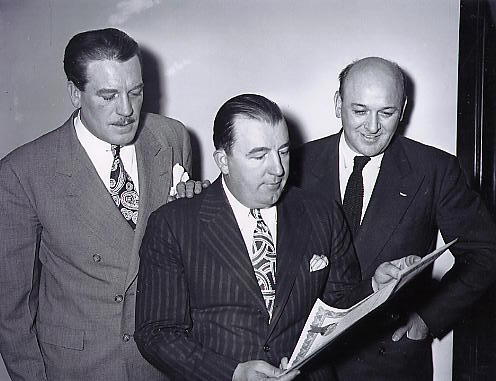 |
FATHER OF
THE INTERSTATE HIGHWAY SYSTEM--As a young member of the U.S. House of Representatives, Jennings
Randolph pioneered joint resolutions and legislative proposals in the
1930s and early 1940s considered important antecedents in construction
of the modern super-highway network.
In this photograph Randolph receives an award from Pat Moore
(left) and Charles B. Donaldson (right) at a roadbuilders association
meeting. (Click here for
“Hijacked Legacy: Ethanol and the Highway Trust).

|
Farm Issues and
Agribusiness Concentration
Jennings Randolph was actively
engaged in agricultural/rural development issues across his career
beginning in the depths of the Great Depression and the New Deal. For
example, he helped pioneer important "back to the farm" projects in West
Virginia which renewed hope and food production in the Tygart
Valley.
In today's farm crisis, Randolph's
spirit and early work still resonate. He fought for the small producers
and reminded audiences to "remember the man and woman by the wayside in
the road." In some respects, JRRP dovetails these themes with the
formation of the West Virginia Agribusiness Council (WV/ABC) and similar
groups around the country as a response to the growing concentration of
America's agro-food system. This system has provided many efficiencies
which are the envy of the world -- and yet, serious distortions and
inequities are being created (see ethanol
subsidy).
In his last term in the Senate,
Randolph resisted pressures from subsidy-seeking "big
agribusiness," and
his international outreach program (AER) seemed to threaten certain
interests vested in maintaining the status quo. Randolph's grassroots
model provided a cross-sectoral dialogue and a cooperative forum for
problem-solving on food-systems issues. This framework produced a "big
picture" perspective.
The resultant search for "common
denominator" solutions actually jeopardized the plans of agribusiness
tycoons whose profiteering depended, in part, on tight control and
compartmentalizing of ag/food sectors while corrupting key governmental
agencies and elected officials.
In March 1999, 23 senators wrote to
President Clinton concerning concentration issues within the agribusiness
sector. In the following November, legislation which would have imposed a
moratorium on large mergers in the ag/food system was defeated 71-27. The
U.S. Congress is continuing to focus on improved antitrust enforcement for
agribusiness. As usual, Jennings Randolph was prescient in his
understanding of what was happening -- not just for West Virginia, but
also the wider world. ABC materials on this subject, including a speech
discussed with Jennings Randolph in St. Louis shortly before his death,
have been widely distributed in Congress.
|
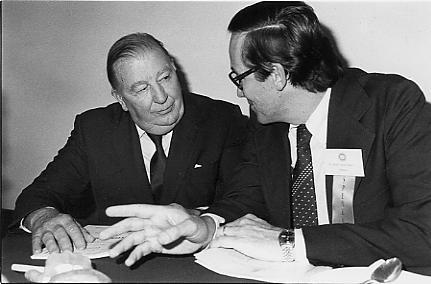
|
BIOFUELS: PROS AND CONS--Senator
Randolph listens as Dr. Agide Gorgatti Netto (Embrapa) describes Brazil's
ethanol programs in May 1983. Randolph routinely used Agri-Energy
Roundtable's Geneva platform to engage differing views on food/energy
issues. Randolph's enthusiasm for synthetic fuels did not extend to
corn-based ethanol which he privately disparaged as a "cruel hoax" on U.S.
farmers.

|

Randolph Genealogy:
Another Honorable Mention
In November 1999, at Shepherd
College, JRRP announced some newly discovered genealogical links between
Jennings Randolph and his ancestors, including CSA Lt. General James
Longstreet, who was General Lee's most trusted subordinate. Longstreet was
a distant cousin of Randolph, as both descended from Edmund Fitz-Randolph,
but shared only a short time-window of life with each other (1902-04).
Like Randolph, Longstreet spoke truth to power -- and he struggled for
national reconciliation after the Civil War.
Both men suffered greatly in their
later years, as the spinners of "political correctness" tried to airbrush
their lives and accomplishments from memory. Longstreet, a visionary
tactician who understood military technology and rendered
open-field/frontal assaults futile, was unfairly blamed for the
Confederate loss at Gettysburg. Seventy years later, Randolph was
ridiculed in Congress while fighting for an aeronautical navy (i.e.,
aircraft carriers vs. battleships). In 1940, Randolph cast a decisive
tie-breaking vote in the passage of the Draft Act providing President
Roosevelt with a critical mandate helping to prepare the Nation for World
War II.
For further information, see ABC's
Heritage
Preservation Committee (HPC), General
Longstreet Recognition Project (GLRP), and William
Jennings Bryan Recognition Project (WJBP).
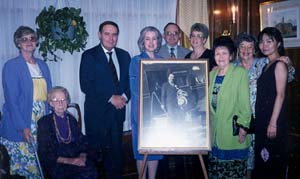 |
RANDOLPH
REVELERS -- A few members of the Elkins dinner group gather around
the American Airlines portrait. From left to right are Mary Jones,
Margaret Walsh, Nick Hollis and Pat Griffith, Wayne and Sue Sheets,
Eldora Nuzum, Mary Frances Shepler, and Sachiko Wada.

|
Lecture/Slide
Presentation Programs
JRRP has sparked a flurry of
activities expanding awareness of and interest in Jennings Randolph. Since
the memorial dinner on the first anniversary of his death, JRRP has
conducted programs including reunions for historical, agricultural,
university and senior groups. For example, JRRP spoke to the Cherry River
Navy Admirals in Richwood, had discussions in the WV Senate with President
Earl Ray Tomblin and others in Charleston, and completed that week of
campaigning with an outdoor presentation for the Civilian Conservation
Corps at Camp Woodbine followed by a meeting a Marshall University in
Huntington and a gathering of friends in Elkins for Margaret Walsh's 96th
birthday. More recently, JRRP has addressed audiences at the National Air
and Space Museum (July 2002), the Romney Senior
Center, George Mason University's Institute for Conflict Analysis and
Resolution, Shepherd College, WV Senior Community Service Employees
Program, Clarksburg Civic Club, Salem Area Chamber of Commerce, South
Charleston City Council, West Virginia-Ohio Youth Governors, Charles Town
Kiwanis Club, YMCA Camp Horseshoe Hi-Y Leadership, and
various historical groups including the Stonewall Jackson and Harpers
Ferry Civil War Roundtables.
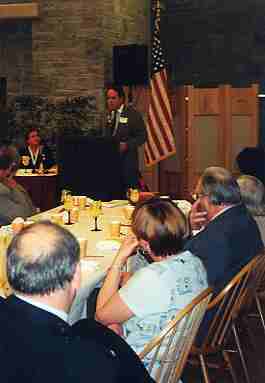 |
KIWANI FETE -- Nick Hollis
speaks on Jennings Randolph before audience in Shepherdstown, West
Virginia.

|
The New Populism
On September 18, 2000 a
meeting in Jennings Randolph's home town of Salem, West Virginia, JRRP
sparked considerable media interest calling for a "New
Populism" dedicated to Randolph's spirit of citizenship activism on
behalf of rural America and of the less fortunate (particularly small
farmers), decency and humility in American politics. The speech,
entitled "Bryan and Randolph: Politics, Honor and Election
2000," was delivered by Nick Hollis before the Salem Area Chamber
of Commerce (act now and join our "campaign -- see enrollment form
below).
In the aftermath of Election 2000,
young people seem particularly interested in Randolph's leadership style,
his decency and humility. The JRRP campaign for citizenship education
continues honoring "The Father of the 26th
Amendment" by reminding
audiences that Jennings Randolph's persistence made it possible for 18-20
year-olds to vote. His views are indeed gaining traction among students
who could be a significant factor at the polls.
JRRP media coverage has been
excellent, including an article with photos in the Randolph Herald
February 21, 2002 "From Randolph to Washington" and Springfield Union
News, May 13, 2002, "Hatfield Raid a Story of Courage, Heroism by Mike
Plaisance.
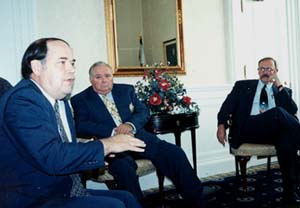 |
LEGISLATORS LISTEN -- Nick Hollis (left) describes Jennings
Randolph Recognition Project to West Virginia Senate President Earl
Ray Tomblin. Seated are senior senators William R. Sharpe
(center) and Jon Blair Hunter (right). Clarksburg
Exponent-Telegram, 4.12.04.

|
Financial
Support
The Jennings Randolph Recognition Project is
grateful to a growing list of benefactors:
U.S. Senator Brock
Adams (ret)
Washington |
Marion and Joe
McQuade
West Virginia |
Betsy Amin-Arsala
Washington DC |
Admiral Thomas Moorer
(ret)
Maryland |
Patricia C.
Berger
Massachusetts |
Nancy Morrison
West
Virginia |
Bondex
International
Missouri |
James A. Norman
West
Virginia |
President Jimmy
Carter
Georgia |
U.S. Senator Sam Nunn
(ret)
Georgia |
Edwin I.
Colodny
Florida |
U.S. Senator Claiborne
Pell (ret)
Rhode Island |
James R. Cottrill
Pennsylvania |
R.C.
Powell
Colorado |
Dorothy U. Davis
West
Virginia |
John M. Pratt
Ohio |
Laura Goff Davis
West Virginia |
Gustavo de los Reyes
Delgado
Florida |
Chief Joseph
Esema
Nigeria |
L. Wayne Sheets
West
Virginia |
General Electric Fund
Connecticut |
Suzanne
Snedegar
Maryland |
James A.H. Hafner, Jr.
Massachusetts |
Daniel F. Snell
West
Virginia |
E. Davisson Hardman
West
Virginia |
Jessie V. Stone
Illlinois |
James H. Harless
West
Virginia |
W. Clement
Stone
Illinois |
U.S. Senator Mark O.
Hatfield (ret)
Oregon |
U.S. Senator Strom
Thurmond
South Carolina |
U.S. Senator Jesse
Helms
North Carolina |
U.S. Senator Joseph D.
Tydings (ret)
Maryland |
Nicholas E.
& Patricia G. Hollis
Washington DC |
Hon. Cyrus R. Vance
New
York |
U.S. Senator Walter
Huddleston (ret)
Kentucky |
Margaret Walsh
West
Virginia |
Marion
Jennings
Vermont |
Hays T.
Watkins
Virginia |
Frances Brigham Johnson
Virginia |
Dr. David Waxman
West
Virginia |
Mary S. Jones
West
Virginia |
Bruce G. Wells
West Virginia |
David King
Ohio-West Virginia YMCA |
West Virginia AFL-CIO
West Virginia
Agribusiness Council |
George C.
Lazar
Pennsylvania |
Senator Eugene
Whelan
Canada |
Daniel P. Lutz
West Virginia |
Margaret Wilson
Young
West Virginia |
George S. McGovern
Montana |
|
| |
|
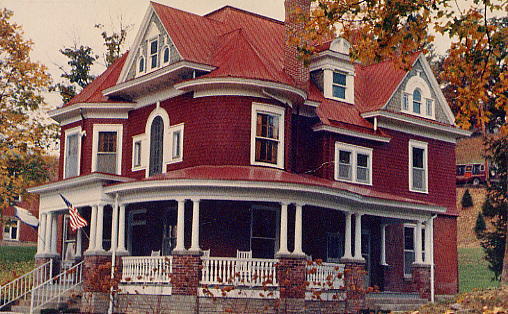
|
RANDOLPH FAMILY HOME - WEST MAIN
STREET - SALEM WV
Friends of U.S. Senator Jennings Randolph donated funds to renovate his
childhood home as a retirement gift. For twenty years (1985 to 2005)
this historic property housed the Jennings Randolph Center for Public Service
and was filled with memorabilia from
his long political career. His official papers and photographs are now in the West
Virginia State Archives at Charleston, and the house has become the
residence of Salem International University's president. A recent meeting at Salem
featuring JRRP and the William Jennings Bryan Recognition Project
generated considerable media attention on "new populism."

|
| |
| |
|
AUTUMN DAYS
by Jennings Randolph
Autumn days are wonder days
With colors red and gold
Summer is gone, fall is here
And the year is growing old.
Often I do like to think
That God with mystic hand
Has reached down from heaven
And painted all the land.
 |
|
U.S. Senator Jennings Randolph enjoys a playful moment on a warm
October afternoon.
|
"Problems are truly wonderful
because we have the opportunity to solve them."
The Washington Star,
November 6, 1978


Enrollment
Contribution
Please consider a donation to the Jennings
Randolph International Recognition Project (JRRP) which is tax-deductible under IRS
Code 501(c)(3) with checks made payable to:
THE AGRIBUSINESS COUNCIL-
JRRP
P.O. Box 5565
Washington, DC
20016
Tel: (202) 296-4563
agenergy@aol.com
"Building bridges through
associations with peoples of the world"
Home |












